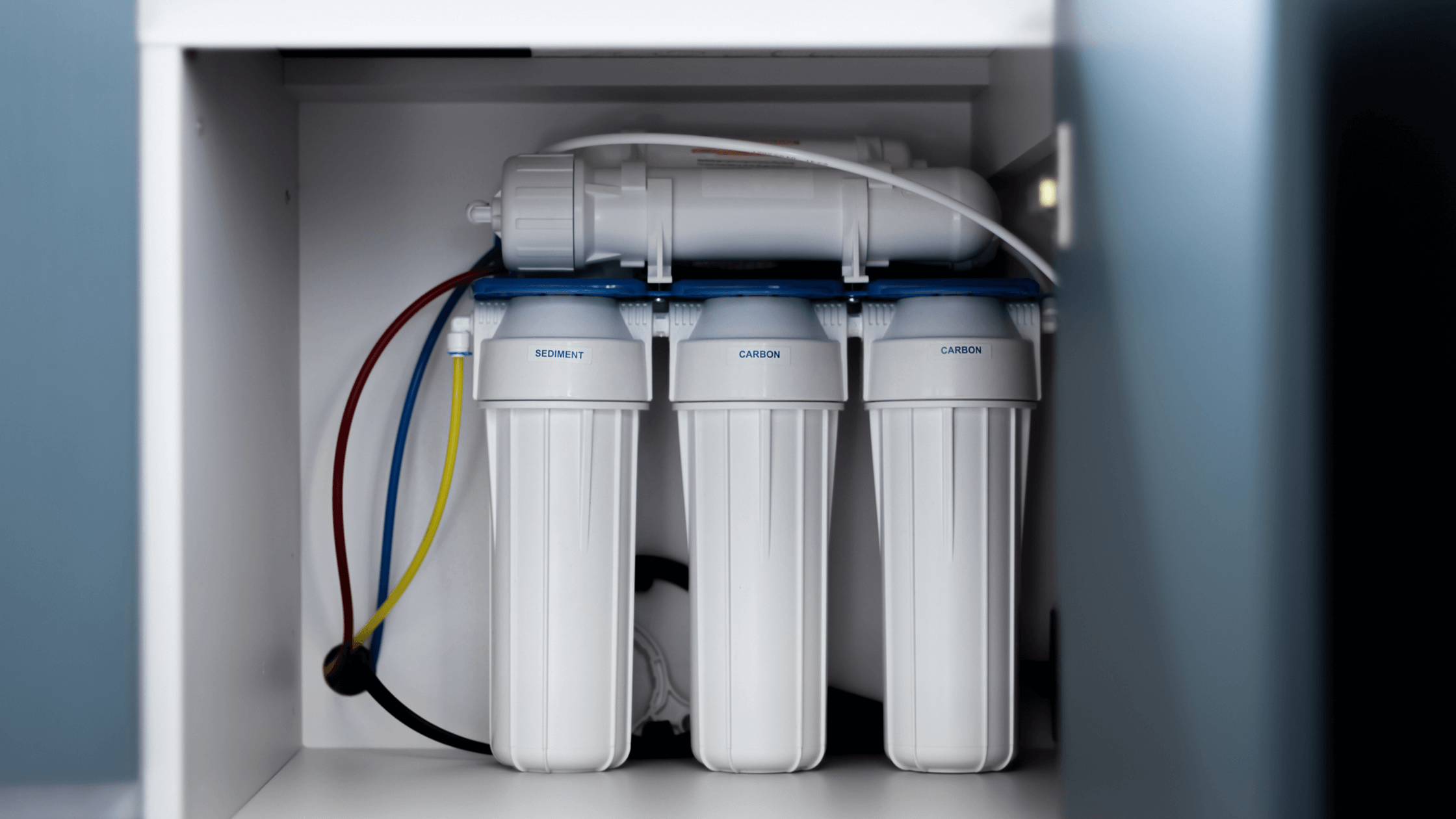Clean water is essential for a healthy lifestyle, yet tap water often contains impurities that can harm your health and damage your appliances. Installing a water filtration system eliminates contaminants like chlorine, lead, and bacteria, providing safer, better-tasting water throughout your home. From reverse osmosis systems for drinking water to whole-house filtration systems, there are options to suit every household’s needs.
Quick look
- Tap water often contains harmful substances like chlorine, lead, and bacteria, which can pose risks to health and the home.
- Water filtration systems improve water quality by removing impurities at the source.
- Types of systems include reverse osmosis, carbon filters, sediment filters, and UV systems, each with unique benefits.
- Whole-house systems ensure clean water at every tap, extending the lifespan of appliances and plumbing.
- Choosing the right system depends on your budget, water quality needs, and maintenance preferences.
Water filtration system basics
What are water filtration systems?
Water filtration systems are devices designed to purify water by removing harmful contaminants such as chemicals, heavy metals, bacteria, and sediment. These systems enhance water quality, making it safer to drink, cook with, or use for bathing. Filtration methods vary, from basic systems that improve taste and odor to advanced multi-stage systems that address serious health concerns.
Filters work by trapping unwanted particles or chemically neutralizing harmful substances. Some systems are installed at a single faucet, while others, like whole-house systems, purify all water entering the home. Choosing the right system depends on the specific contaminants in your water and your household’s needs.
How do multi-stage filtration systems work?
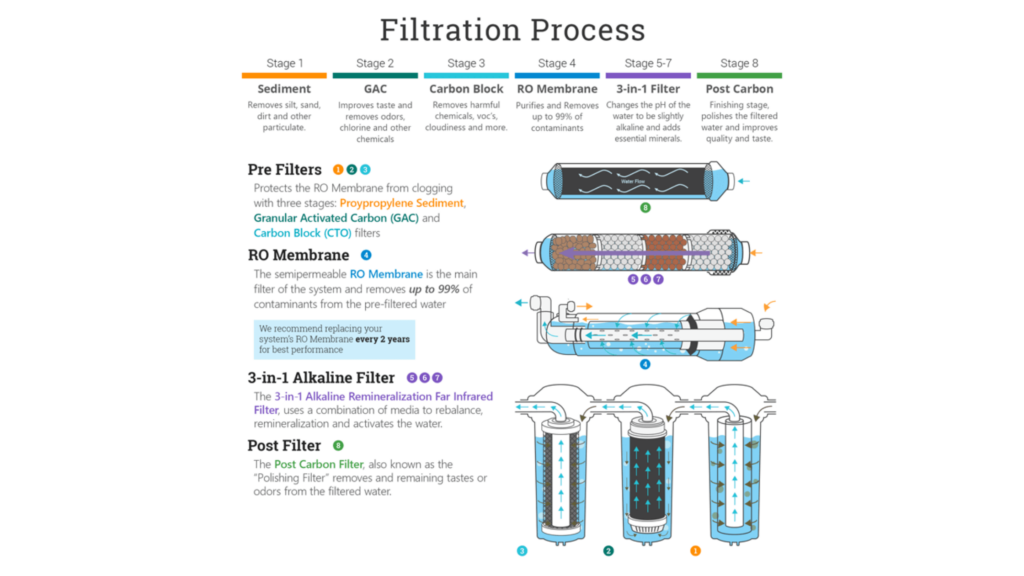
Multi-stage systems combine different types of filters to address various water quality issues. A typical setup includes a sediment filter to trap large particles like dirt and rust, followed by an activated carbon filter to remove chlorine and chemicals, and then a reverse osmosis membrane for finer contaminants such as lead and nitrates.
Additional stages, like UV filters, can be included for disinfection, while remineralization stages add healthy minerals back into water for better taste. This layered approach ensures comprehensive purification, making multi-stage systems popular for households seeking the highest water quality.
Types of water filters
1. Reverse osmosis
Reverse osmosis (RO) systems are highly effective at removing contaminants by forcing water through a semi-permeable membrane. This process eliminates impurities such as lead, nitrates, fluoride, and bacteria, ensuring the water is clean and safe to drink. RO systems typically feature multiple filtration stages, including pre-filters to remove sediment and carbon filters to improve taste.
One of the main advantages of RO systems is their ability to filter out even microscopic particles. However, they have some drawbacks, such as water wastage during filtration. Modern models often include water-saving features to address this issue. Reverse osmosis systems are best suited for drinking and cooking water rather than whole-house applications.
2. Carbon filters
Carbon filters use activated carbon to adsorb impurities like chlorine, pesticides, and volatile organic compounds (VOCs). They are excellent for improving the taste and odor of water, making them a common choice for countertop or faucet-mounted systems.
Activated carbon’s porous structure effectively traps chemicals and impurities. However, carbon filters are less effective at removing minerals, salts, or microorganisms. Therefore, they are often combined with other filtration methods for comprehensive water treatment. Carbon filters are also low-cost and easy to maintain, making them a practical option for many households.
3. Sediment filters
Sediment filters are the first line of defense in a filtration system. They remove larger particles like sand, rust, and dirt from the water. These filters prevent clogging and protect other filters in multi-stage systems, ensuring efficient operation.
While sediment filters don’t remove chemicals or microorganisms, they are essential for improving water clarity and reducing wear on plumbing and appliances. They are especially beneficial for homes that rely on well water, which often contains high sediment levels. Regular replacement is necessary to maintain their effectiveness.
4. Ultraviolet (UV) filters
Ultraviolet filters use UV light to kill bacteria, viruses, and other microorganisms in water. This chemical-free method effectively disinfects water, making it ideal for households concerned about microbial contamination.
UV filters are often used with other systems, as they don’t remove sediment, chemicals, or heavy metals. They require a power source to operate and must be maintained regularly to ensure the UV lamp remains functional. Despite these considerations, UV filters provide peace of mind by ensuring water is free from harmful pathogens.
5. Ion exchange filters
Ion exchange filters are designed to soften water by replacing hard minerals like calcium and magnesium with sodium or potassium ions. This process prevents scale buildup in pipes and appliances, extending their lifespan and improving efficiency.
Ion exchange filters can remove certain heavy metals in addition to water softening, making them versatile for improving water quality. However, they may not address other contaminants like chlorine or bacteria, so they are often used alongside other filtration methods.
6. Ceramic filters
Ceramic filters are made from porous ceramic material that physically traps contaminants as water passes through. They are effective at removing bacteria, protozoa, sediment, and chlorine but are not as effective at eliminating viruses or dissolved chemicals.
One major advantage of ceramic filters is their long lifespan and the fact that they can be cleaned and reused multiple times. They are often used in gravity-fed systems and can be combined with other filtration technologies for more thorough purification. Ceramic filters provide a cost-effective, eco-friendly solution for improving water quality without electricity.
7. Distillation systems
Distillation systems work by heating water to its boiling point, turning it into steam, and then cooling it back into water. This process removes contaminants with higher boiling points, such as heavy metals, salts, and bacteria. However, distillation does not effectively remove chemicals with low boiling points, like chlorine or some volatile organic compounds (VOCs).
These systems are highly effective at purifying water and are often used in laboratories and industries where the highest level of purity is required. While not as common for household use as carbon or reverse osmosis filters, distillation is still a reliable option for those who need clean, contaminant-free water for specific needs, such as in medical or cosmetic applications.
The problem with tap water
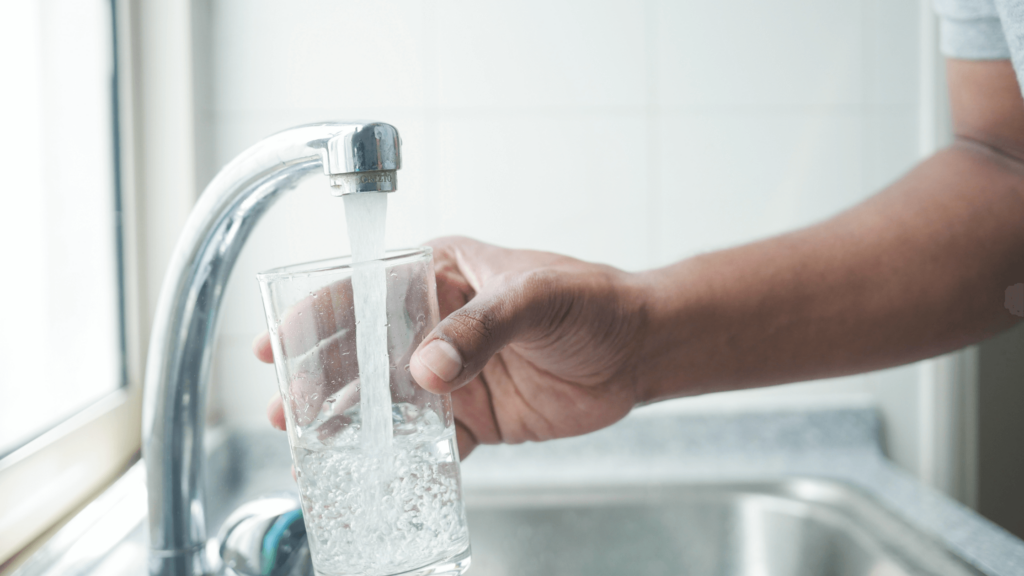
While generally safe under federal regulations, tap water often contains contaminants that can affect health and home appliances. Despite the U.S. Environmental Protection Agency’s (EPA) guidelines, studies have shown that many municipal water systems contain harmful substances. The Environmental Working Group (EWG) found that many U.S. water supplies have trace amounts of contaminants like arsenic, lead, and PFAS (so-called “forever chemicals”) at levels that exceed health guidelines. These substances can be harmful even in small amounts, leading to long-term health risks such as developmental issues, cancer, and damage to the liver or kidneys. These findings highlight the importance of ensuring the water you drink and use at home is properly filtered and free from harmful contaminants.
Chlorine, commonly used to disinfect public water supplies, can leave unpleasant odors and byproducts like chloramines, which may have health implications if consumed over time. In addition, chlorine can strip moisture from the skin and hair, making it uncomfortable for bathing. Hard water, which is rich in minerals such as calcium and magnesium, can also cause problems around the home. Over time, these minerals can accumulate, forming scale that clogs pipes and damages appliances like dishwashers and water heaters. Filtering tap water not only improves taste and odor but also protects your health and ensures the longevity of your home appliances.
6 perks of installing a water filtration system
1. Cleaner drinking water
Filtered water removes harmful chemicals, heavy metals, and microorganisms that can be present in tap water, making it safer and more refreshing to drink. Common contaminants like chlorine, lead, and pesticides can compromise water quality and pose health risks over time. By removing these impurities, filtration systems offer cleaner water, improving safety and enhancing taste.
2. Healthier skin and hair
Chlorine, often used to disinfect tap water, can be harsh on skin and hair, stripping away natural oils and causing dryness. Hard water, which contains high levels of minerals like calcium and magnesium, can also leave skin feeling rough and hair looking dull and brittle. Filtering your water can reduce these harsh effects, leaving your skin softer, smoother, and more hydrated.
3. Extended appliance life
Sediment, minerals, and impurities in unfiltered water can accumulate inside appliances like dishwashers, washing machines, and water heaters, causing wear and tear over time. These particles can build up, leading to clogs, reduced efficiency, and costly repairs. By removing sediment and minerals, a filtration system helps prevent these issues, allowing your appliances to run more smoothly and efficiently.
4. Eco-friendly solution
Filtered water is an eco-friendly alternative to bottled water, which contributes to significant plastic waste. According to the Earth Day Organization, over 50 billion plastic bottles are used each year in the U.S. alone, many of which end up in landfills or the ocean. Switching to filtered water reduces the demand for plastic bottles, minimizing your environmental footprint.
5. Fewer plumbing repairs
With its high mineral content, hard water can wreak havoc on plumbing systems. Over time, the minerals in hard water can accumulate in pipes, causing limescale buildup that restricts water flow and can even lead to blockages. This can put unnecessary strain on your plumbing, causing leaks and reducing the efficiency of your water supply. By installing a water filtration system that targets minerals and sediment, you can help prevent these issues and reduce the frequency of plumbing repairs.
6. Peace of mind
Access to clean, filtered water offers peace of mind, especially for households with young children, elderly family members, or individuals with compromised immune systems. Knowing that your water is free from harmful contaminants like lead, chlorine, and bacteria ensures that your family drinks, bathes, and cooks with safe water. This sense of security is especially important in areas where tap water quality is uncertain or subject to contamination, such as during seasonal changes or after natural disasters.
Home filtration systems to consider
Aquasana Rhino 10-year whole house water filter
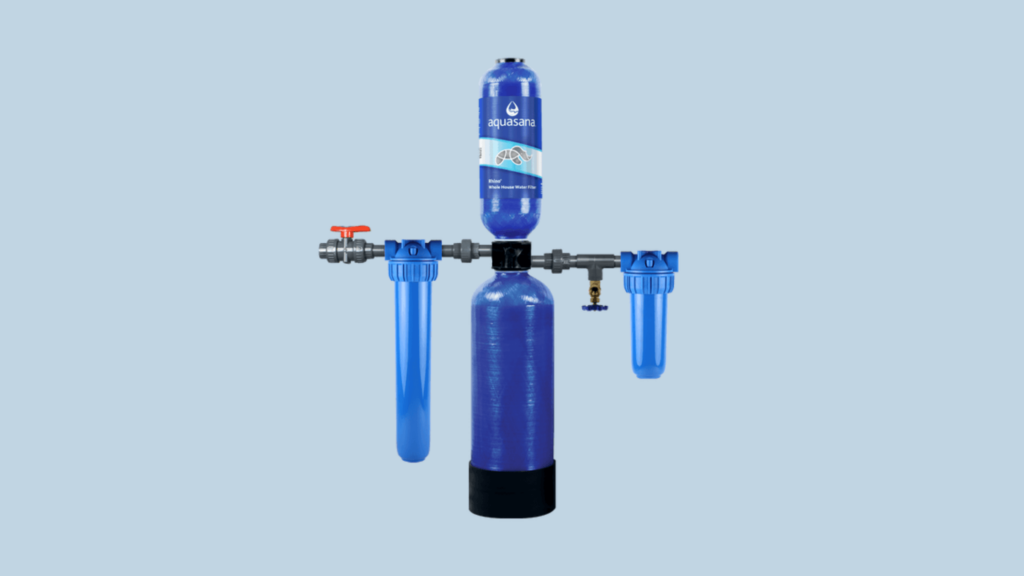
| What we love | Things to consider |
| – Filters a wide range of contaminants, including chlorine and heavy metals – Durable 10-year lifespan and cost-effective | – Requires professional installation – Large upfront investment |
The Aquasana Rhino 10-year whole-house water filter is a powerful system that provides clean water throughout your home. Its multi-stage filtration system effectively removes contaminants like chlorine, heavy metals, pesticides, and volatile organic compounds (VOCs) while improving your water’s overall taste and odor.
One of its best features is its durability—each system is built to last up to 10 years or filter 1,000,000 gallons of water, making it a cost-effective option in the long run. It also protects your plumbing and appliances by reducing scale buildup. However, professional installation is recommended to ensure proper setup, and the system requires significant space in your home.
Berkey water filter
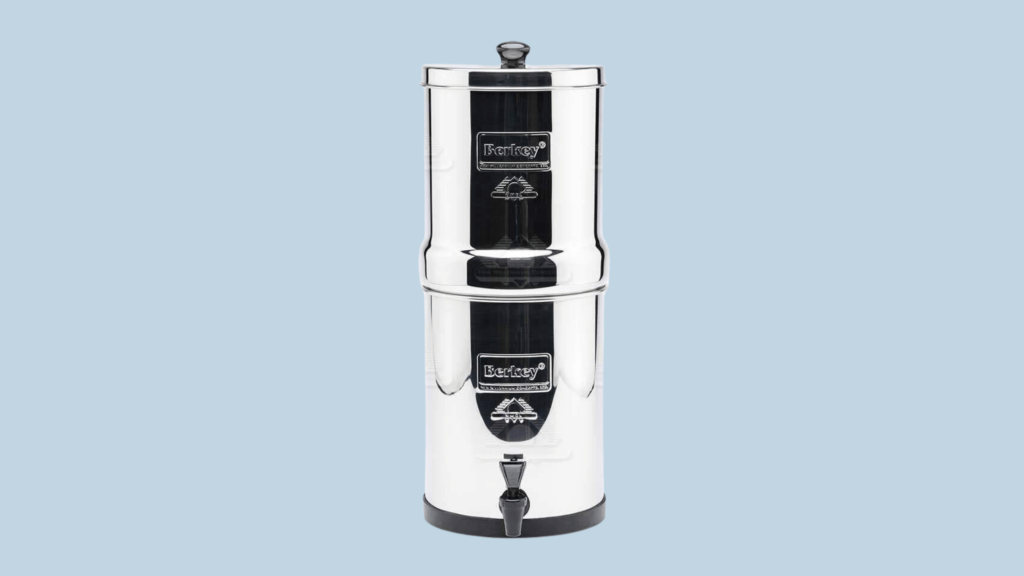
| What we love | Things to consider |
| – Portable gravity-fed system – Excellent for emergency or off-grid use | – Bulky design – Filters need regular cleaning for optimal performance |
The Berkey water filter is popular for those seeking versatility and portability. Its gravity-fed design does not rely on electricity or plumbing, making it an excellent option for emergency preparedness, camping, or off-grid living. The filter effectively removes harmful contaminants like bacteria, viruses, chlorine, and heavy metals, ensuring clean drinking water in almost any situation.
Available in various sizes, it easily accommodates households of different sizes. While its robust filtration capabilities are impressive, the system’s bulky design may not seamlessly fit into all kitchen spaces. Additionally, frequent cleaning and periodic filter replacements are necessary to maintain its effectiveness. The Berkey is a solid investment for families prioritizing high-quality, portable filtration.
iSpring RCC7-AK 6-stage reverse osmosis system
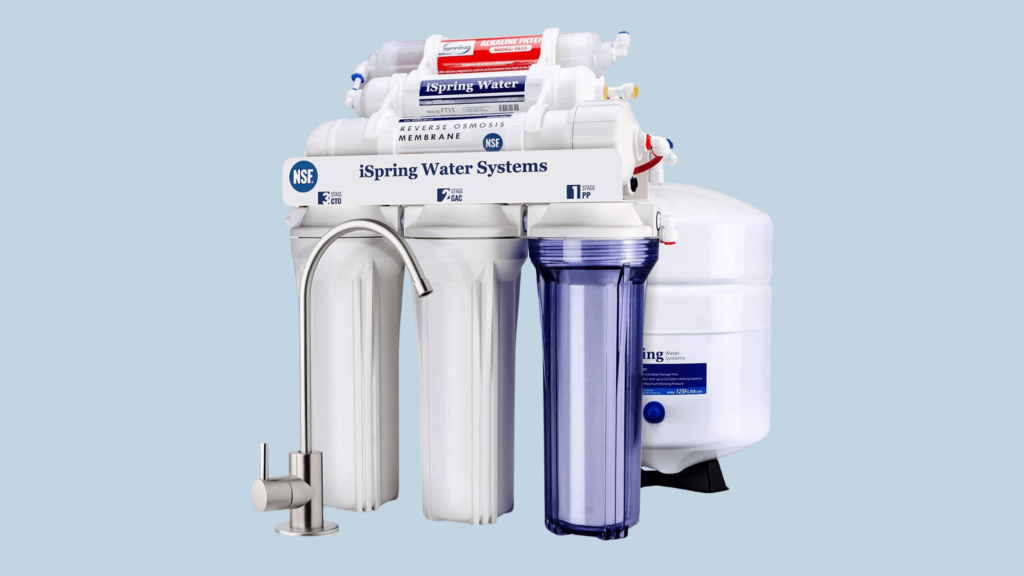
| What we love | Things to consider |
| – Comprehensive 6-stage filtration – Remineralizes water for improved taste and pH balance | – Produces wastewater during filtration – Installation can be complex |
The iSpring RCC7-AK is a six-stage reverse osmosis (RO) system that provides exceptionally clean and great-tasting water. It uses advanced filtration to remove up to 99% of contaminants, including lead, chlorine, fluoride, arsenic, and bacteria. Its remineralization stage sets this system apart, which adds back beneficial minerals like calcium and magnesium for a healthier and better-balanced pH.
Designed for under-sink installation, the iSpring RCC7-AK provides a continuous supply of purified water directly from a dedicated faucet. While it’s highly effective, the RO process produces wastewater as a byproduct, and installation may require technical expertise. For households looking for an under-sink system that balances performance with taste, the iSpring RCC7-AK is an excellent choice.
PUR plus faucet mount water filter
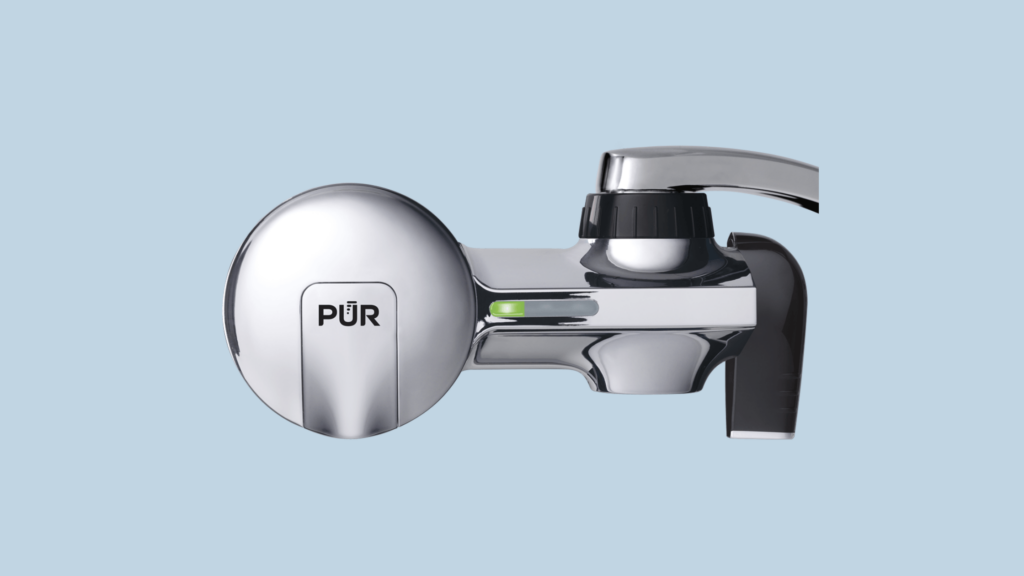
| What we love | Things to consider |
| – Quick and easy installation – Great for chlorine and lead removal | – Limited to one faucet – Cartridges need frequent replacement |
The PUR Plus faucet mount water filter is a convenient solution for renters or homeowners who want clean water without the hassle of installing a larger system. It reduces chlorine, lead, and other impurities, improving water taste and safety. Its compact design fits most standard faucets and allows for quick installation with no tools required.
A built-in indicator lets you know when to replace the filter cartridge, ensuring consistent performance. However, it’s limited to a single faucet, so it may not be the best option for whole-home filtration needs. If you’re looking for an affordable, easy-to-use system that delivers better water straight from your tap, the PUR Plus is a great choice.
Pentair whole house water filtration system
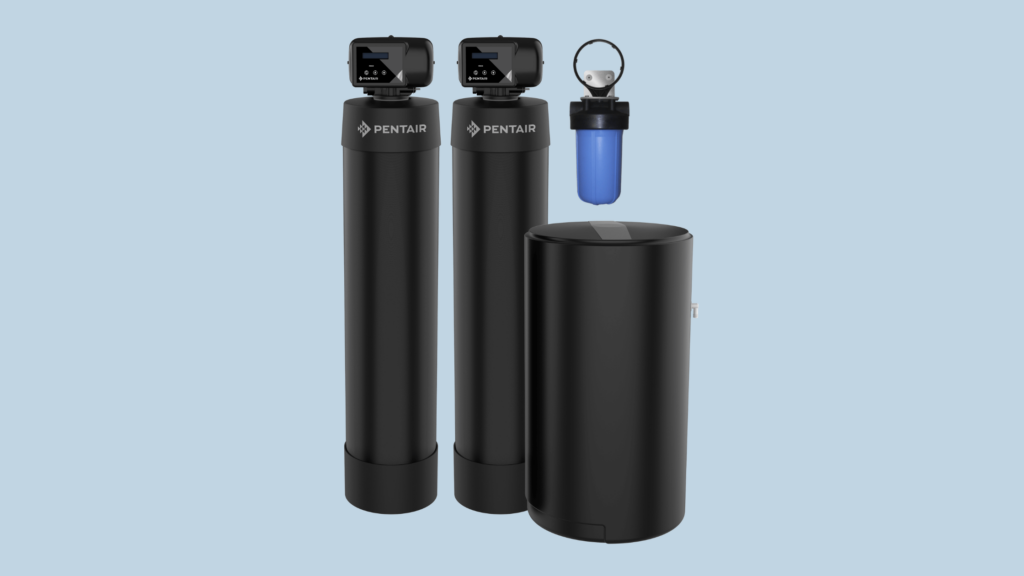
| What we love | Things to consider |
| – Customizable options for different filtration needs – Reduces chlorine, sediment, and hard water minerals | – Some models require professional installation – Higher upfront cost |
The Pentair whole-house water filtration system offers a versatile solution for improving water quality throughout your home. Designed to address a range of concerns, from chlorine and sediment to hard water minerals, this system ensures cleaner, better-tasting water from every tap. Multiple configurations are available, so homeowners can choose the ideal model to suit their specific needs, including options for water softening and advanced filtration.
Its high-flow design supports consistent water pressure, even in large households, while extending the life of plumbing and appliances by reducing scale buildup. While some models require professional installation, Pentair’s systems are built for long-term durability and low maintenance, making them a worthwhile investment.
Things to consider when buying a water filtration system
The benefits of a home water filtration system are significant, but there are some things to consider before making your decision:
- Cost: Water filtration systems range from budget-friendly faucet filters to high-end whole-house systems. Consider both upfront costs and ongoing maintenance expenses.
- Filter replacement frequency: Some systems require monthly filter changes, while others last years. Knowing the replacement schedule helps you plan for long-term costs.
- Filtration methods: Each system targets specific contaminants, so matching the filtration method to your water quality needs is important.
- Installation requirements: Certain systems, like whole-house filters, may require professional installation, while others, like countertop models, are DIY-friendly.
- Water waste: Some systems, such as reverse osmosis, can waste water during operation. To minimize waste, look for models with efficiency features.
Bottom line
Investing in a water filtration system is a smart choice that enhances your health, safeguards your home, and supports the environment by reducing plastic waste. Whether you want to enjoy cleaner drinking water, protect your appliances from scale buildup, or improve your household’s sustainability, a filtration system offers lasting benefits. Plus, with a variety of options available, there’s a solution to meet every need and budget.
For more expert advice and practical tips on improving your living space, follow us on social media and subscribe to our newsletter at Under the Hard Hat.
